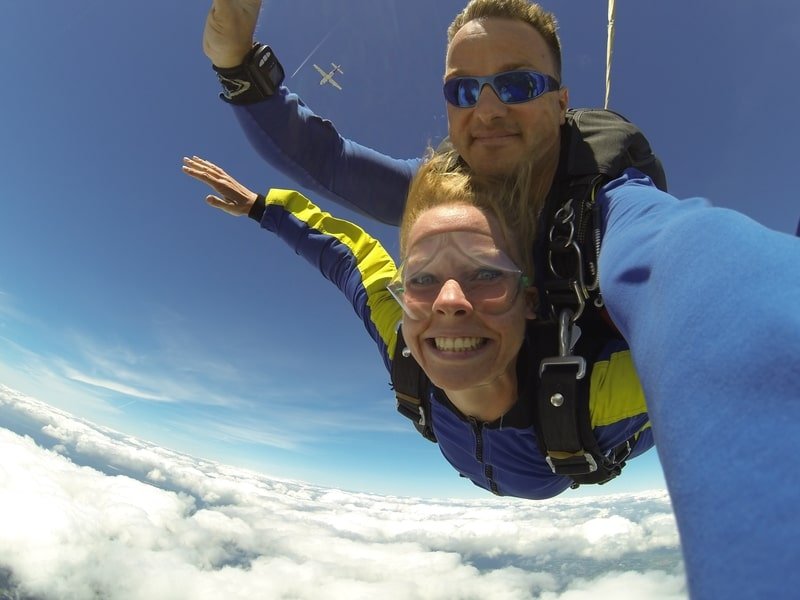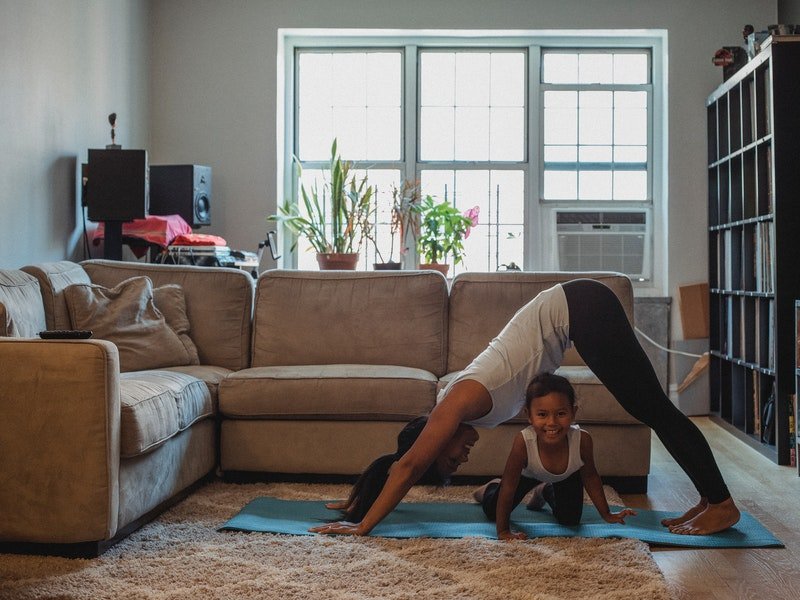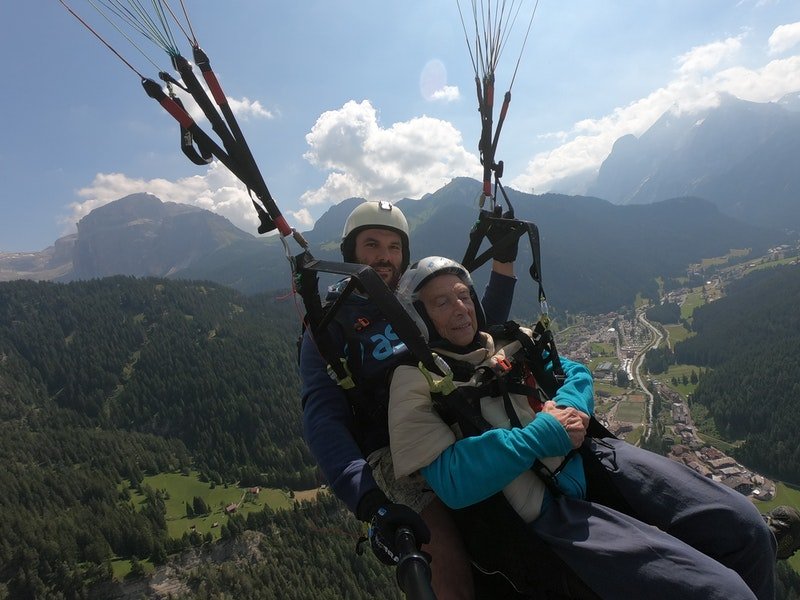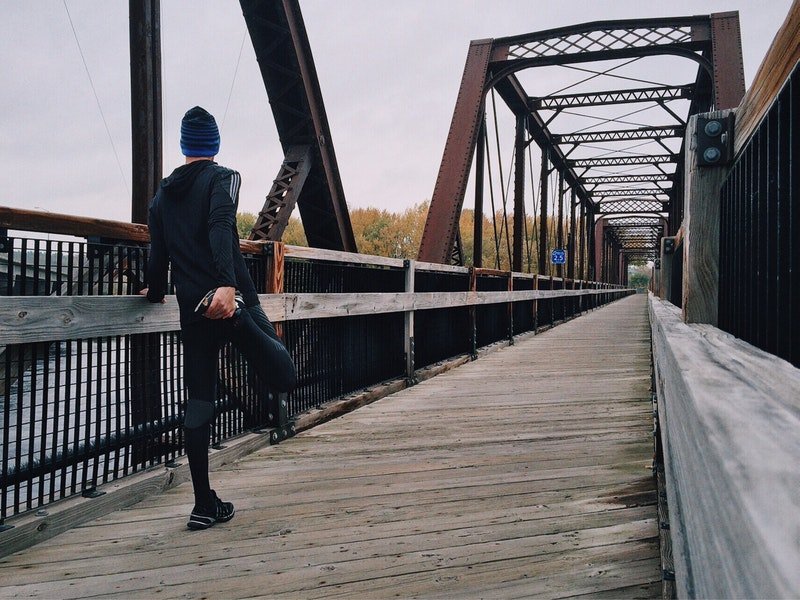We often talk about the mental sides of skydiving (the fear, the excitement, the adrenaline), but how does skydiving affect the body? It’s a very physical sport, yet when researching, you find so much emphasis on the emotional and psychological aspects of the sport.
Even with a single jump, skydiving can positively impact both your mental and physical state. And when taking up the sport as a regular hobby, you’d be surprised how much skydiving will change your life for the better.
Let’s take a deeper look at how skydiving affects the body. We can explore how it affects your body and brain in the short and long term and discuss the pros and cons it brings.
How does your first skydive affect you?

We always say that your first skydive starts the minute you agree to do it. If you’ve never jumped from a great height before, knowing you have committed to jumping from a plane at 12,000 feet will play on your mind. Fears and doubts go in hand with moments of excitement. The anticipation and anxiety you experience will be as physical as they will be mental. Your heart will start to beat a little faster, and the butterflies will flutter their wings in your stomach every time you imagine that moment you leap from the plane.
On the day of your skydive, that nervous energy will be ramped up to an 11. As your adrenaline glands pump hormones into your bloodstream, you’ll be buzzing with anticipation. The ten or so minutes in the plane ride to the jump point will be mentally and physically challenging. While your fight or flight instincts kick in, you’ll be filled with doubts, and an inner voice will question why you are there. That, in turn, can cause physical reactions, such as sweating and shaking. In more severe cases, you’ll feel nauseous, be short of breath, or experience stomach pains.
The minute you take the leap of faith, negative thoughts and feelings get transferred into positive energy. You will tingle with excitement and feel surprisingly stronger as you drop into freefall. Your senses will feel heightened as pain is replaced by pleasure.
How does skydiving affect the body?

Your body will go through a lot of physical changes on a skydive. How skydiving will affect your body depends somewhat on how nervous you get (believe us when we say everyone feels nervous, even a 100+ jumper). The anxiety you feel is your body instinctively pumping you with adrenaline as it thinks you are in danger. This reaction will increase your heart rate and pump more blood through your veins. This intense feeling is fantastic for your body. You’ll quickly experience more mental clarity and even increases your physical strength (temporarily at least!).
When you are jumping at heights over 10,000 feet, the atmospheric pressure can also affect your body. Climbing to such altitudes can lead to a drop of pressure in your sinuses. This build-up is like a backward sneeze, as more air starts to flow in. However, when you jump out of the plane, that pressure is quickly reversed. As you freefall, pressure increases and the air is pushed out of your sinuses. In most cases, you won’t feel this, but it can lead to a mild headache or nausea for some. That usually doesn’t last long and is canceled out by the pleasurable rush of adrenaline you’ll be experiencing.
We always advise new skydivers to go to the toilet before they take their first jump. One common feeling can be the need to go to the bathroom as the jump nears! The nervous energy produced by the anticipation of your skydive can have strange effects on your body. As your inner tension builds, it puts pressure on your bladder, causing the urge to pee. Even if you do find the need to pee on the flight up, it’s usually an overreaction and subside as you try to relax and focus on the jump at hand.
How does skydiving affect the brain?

The brain is a physical muscle, and skydiving can affect it in exciting ways. When your body enters fight or flight mode, it shoots a boost of endorphins through you. The increase in blood flow has lots of positive affects on your brain. As well as briefly increasing muscle strength, it also shoots a boost to your immune system, and your brain begins to function at a higher level. People often observe how they can think so clearly during a skydive freefall.
On a deeper level, many also remark on how skydiving builds confidence and gratitude. Experiencing such incredible views and gaining a greater perspective helps create a more positive outlook on life. This joy and adrenalin also breed happiness. Those feelings combine to give you a kind of contentment and gratitude, which is often contagious.
Can skydiving make your body sore?

If or how skydiving will make you feel sore is down to your current lifestyle and physical state. A reasonably fit person who exercises regularly, taking their first solo or tandem skydive, shouldn’t feel any significant pains or soreness after skydiving. But someone in a lesser physique might feel a few minor aches the next day.
As with any sport, if you’ve been relatively inactive or lack flexibility and then play a sport, you will find yourself using muscles that haven’t been given much of a workout in recent times. The next day those muscles will feel a bit sore, but that’s not a bad thing. Any pains should subside within a few days. These aches are an excellent reminder to be more active and use those muscles more often.
In some cases, you may find a bit of soreness on your legs, where the harness straps run against you. This shouldn’t be too uncomfortable. It’s worth spending a bit of extra time making sure these straps feel comfortable and well-padded before you jump.
Is skydiving good for you?

Although we’ve mentioned some possible negatives regarding the physical side of skydiving, if asked ‘is skydiving good for you?’ the answer would be a quick and resounding ‘YES!’
There are so many positive effects skydiving will have on your life. In fact, we’d go as far as to say skydiving promises to become a life-changing experience. Despite the initial anxiety and doubts you’ll face during the build-up to your first jump, the release of energy you feel after completing the jump is enormous stress relief. Many regular skydivers become addicted to the euphoria a skydive brings. It is the perfect antidote to any stress or frustration you are feeling in your life.
At its core, skydiving is about facing fears and overcoming challenges. The rollercoaster of emotions you will go through leading up to a jump can be immense at times. Fighting against negative instincts, jumping out of the plane, and floating safely back to earth, gives you so much pride and confidence. The sense of achievement and confidence you get from skydiving will be carried into other things you do.
How does skydiving affect your body in the long term?

The long-term affects of skydiving are incredibly positive. If you become a regular skydiver, you may well start to notice an improvement in your strength and physique. Skydiving is a great way to give your core a workout, and it targets your shoulders and glutes particularly well. As you gain experience and confidence as a skydiver, you’ll start trying new moves. With each new movement and position you learn, you’ll give your body a greater workout.
As well as building strength, skydiving can help create greater endurance. As your addiction to the sport starts to grow, you’ll want to jump more and more each time. When you begin reaching 8+ jumps in a day, you will start to push your fitness levels to new heights. The natural energy and strength boost you get from the adrenaline of a jump helps you push more and more each time.
As you push to maintain better form and arching in your skydives, you’ll naturally increase your flexibility. Some of the shapes and arches you try for in the sky act as a fantastic kind of yoga. It won’t take long before you start to notice changes in your flexibility throughout your daily life.

